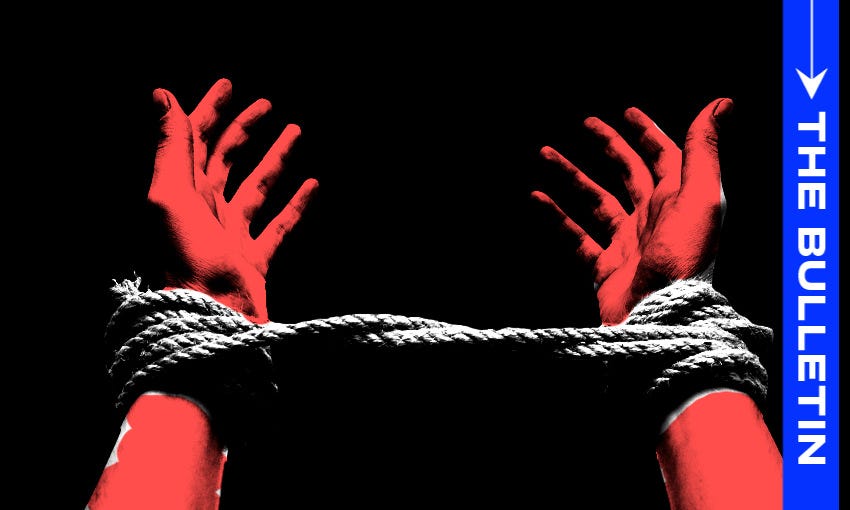The quiet demise of the Modern Slavery Act
The legislation was announced to great fanfare last year, but the new government says addressing forced labour is 'not a priority' right now.
Mōrena, and welcome to The Bulletin for Tuesday, August 6.
In today’s edition: Markets in turmoil amid signs US economy is turning sour; aging renters facing chronic shortage of accessible homes; thousands of Wellingtonians report 4.8 magnitude earthquake. But first, a multi-million-dollar Gloriavale court case has highlighted the issue of modern slavery in New Zealand – and the lack of a law specifically designed to fight it.
Slavery legislation ‘not a priority’
It was announced last year as setting the stage for one of the "world's strongest reporting systems for tackling modern slavery". But legislation aimed at combatting forced labour, both in NZ and abroad, has been dropped, with workplace relations and safety minister Brooke van Velden saying the issue is not a priority for the government. The change in direction became unmistakable last month, when Newsroom’s Sam Sachdeva reported that the government’s Modern Slavery Leadership Advisory Group, made up of business, union and human rights representatives, had been quietly dissolved. At the time the group’s chair, former Air New Zealand chief executive Rob Fyfe, said he was disappointed by the move. “We have a proud heritage as a nation standing up for what’s right and fair. Yet our voice is now missing on this issue, while people are being abused and their lives destroyed, producing goods and services that we consume,” Fyfe said.
Businesses argued in favour of law
Under the proposed legislation, companies with more than $20m in revenue a year would have been required to report on actions they were taking to address the risk of exploitation in their operations and supply chains. The plans announced following a years-long pressure campaign to introduce a modern slavery law, including a public call for action from some of New Zealand’s largest businesses, including Barkers, Coca-Cola NZ, Countdown, Fix and Fogg, PWC and The Warehouse. When news of the u-turn landed in May, business consultant Gary Shaw told Newsroom the government’s “well-meaning but misguided” attempt to protect businesses from red tape made no sense when so many companies wanted the legislation. The reason for businesses’ enthusiasm is largely to do with competition: as more and more countries adopt modern slavery laws, NZ exporters will find have to deal with trickier supply chain management and increased legal risks in jurisdictions with stricter regulations. For example, the European Parliament recently approved a regulation enabling the EU to prohibit the sale, import and export of goods made using forced labour.
Gloriavale members allege slavery
While the demise of the modern slavery law got little attention earlier this year, it was back in the spotlight following news last month that former Gloriavale members had filed a multi-million-dollar class action lawsuit against the Christian commune where they claim they were held as slaves from birth. They are also suing five government agencies which they say breached international treaties by failing to protect girls and boys from the worst forms of child labour, RNZ reports. The case demonstrates that modern slavery is not just an overseas issue. The 2023 Global Slavery Index estimated that on any given day in 2021, there were 8,000 individuals living in modern slavery in New Zealand. While New Zealand ranks relatively low on the index compared to other Asia Pacific countries, the report noted that “several forms of modern slavery are reported in New Zealand, including forced labour, forced sexual exploitation of adults, commercial sexual exploitation of children, and forced marriage”.
Need for NZ law raised by UN human rights panel
New Zealand’s lack of modern slavery law was brought up during New Zealand’s appearance before the United Nations in April. The UK, US and Mexico were among the countries who called on New Zealand to do more to address risks of forced labour in businesses' supply chains, Newshub reported. The call was part of the UN’s periodic review of New Zealand’s human rights record, where other topics of concern were the high number of incarcerated Māori, particularly women and young people, and New Zealand’s increasingly large remand population. It came a year after criticism of NZ’s response to the Royal Commission of Inquiry into Abuse in State Care by the UN Committee against Torture. The committee said it was “seriously concerned” that “no individual has been investigated or held accountable for the numerous allegations of torture and ill-treatment” and “urged New Zealand to implement the inquiry’s recommendations and to provide victims with full redress, including compensation and rehabilitation”.
TJ Perenara on pilates, parenting and being a sore loser
TJ Perenara credits his success on the rugby field to one of the biggest sacrifices he's made – time. The All Blacks and Hurricanes legend joins host Jane Yee for a raw and honest chat on Kiwibank's This is Kiwi podcast.
Read an excerpt from the interview on The Spinoff now and listen to the full episode wherever you get your podcasts.
Markets in turmoil amid signs US economy is turning sour
Stockmarkets around the world are a sea of red after a dramatic day’s trading. The US Dow Jones index dropped around 1,000 points at market open, while Japan’s Nikkei extended its downward trajectory to record its worst ever two-day decline ever, dropping 18.2% in the last two trading sessions. However there was some recovery throughout the (US) day: “Apple, the world's most valuable company, is down around 4% after earlier falling as much as 12% at the start of the trading day. Amazon.com, which fell 10% earlier, is now trading lower by just about 4% as well,” reports NBC News. The market panic set in after Japan raised its interest rate to 0.25%, prompting a collapse in so-called "carry trades" in which traders borrowing in Japanese yen, which had been subject to lower interest rates, in order to buy assets. At the same time, the US government's monthly report on the job market showed a significant slowdown in hiring by employers. Worries that the Federal Reserve may have kept the brakes on the economy too long spread through the markets, explains the AP via Stuff.
Show your support, join up today!
"Thank you to The Spinoff team for a balanced news, arts, culture, society, for the (mostly) clear sighted writing and, especially, for the intelligent satire. There needs to be space to be able to laugh" – From a Spinoff member.
If you've appreciated our political satire, as well as our journalism, please consider becoming a member today.
Aging renters facing chronic shortage of accessible homes
By 2048 the number of over-65s who are renting could double to more than 600,000 – far too many people for the private rental market to absorb, according to new research from the Retirement Commission. The problem will be particularly acute for those superannuitants requiring accessible accommodation, the commission found. Its survey of 700 landlords found that while most wanted to keep retirees as tenants, "few have actually made the kinds of accessibility modifications that are needed to support people to remain in place”, the commission’s policy specialist Jordon King told RNZ’s Checkpoint. Accessibility will become an increasingly pressing issue as fewer people have a paid-off house by the age of 65. The previous assumption was that homeowners could release equity to allow them to make accessibility modifications and stay in their own home in old age, but "that reality is gone", said King.
Click and Collect
A 4.8 magnitude earthquake struck near Wellington just before midnight. More than 17,000 people reported feeling the trembor, according to GeoNet.
Three engineers are facing disciplinary charges for errors in the design of a Tauranga car parking building which cost $19 million to build but had to be sold for just $1.
Business owners on Wellington’s Courtenay Place planning a New Year’s street festival this year, but the council is yet to say yes to closing the street.
Finn Butcher, a 29-year-old New Zealander, has won first ever kayak cross Olympic gold.
Joel MacManus considers why firefighters often oppose pedestrian safety measures. Zoe George is ready for the powerhouse Olympics rivalry between two New Zealand canoe racers. Claire Mabey reports from the Aotearoa Book Industry Awards, featuring the Topp Twins and lots of tears. Toby Manhire reports from the National Party conference, in which Luxon sought the light – without bringing the (literal) heat. Jo Waitoa imagines an economy grounded in Māori values. And our pop culture crew has all the new movies and TV on streaming services this week.
That’s it for today, thanks for reading.
Let me know in the comments, or get in touch with me at thebulletin@thespinoff.co.nz, if you have any feedback on today’s issue or anything in the news.
If you liked what you read today, share The Bulletin with friends, family and colleagues.














The cynic in me asks "which of the NACT1st big donors DIDN'T want the anti-slavery legislation?" Why would ANY NZ govt be AGAINST addressing forced labour? No wonder ordinary businesses supported it because increasingly overseas markets care about how & by whom products are made - so being less active on climate change measures & forced labour protections is actually "anti-business" for both exports & products & services at home that visitors will want (not to mention it is the right & sane thing to do?)
The TJ Perenara interview on This is Kiwi with Jane Yee is excellent. What a top guy, so eloquent and so much wisdom.